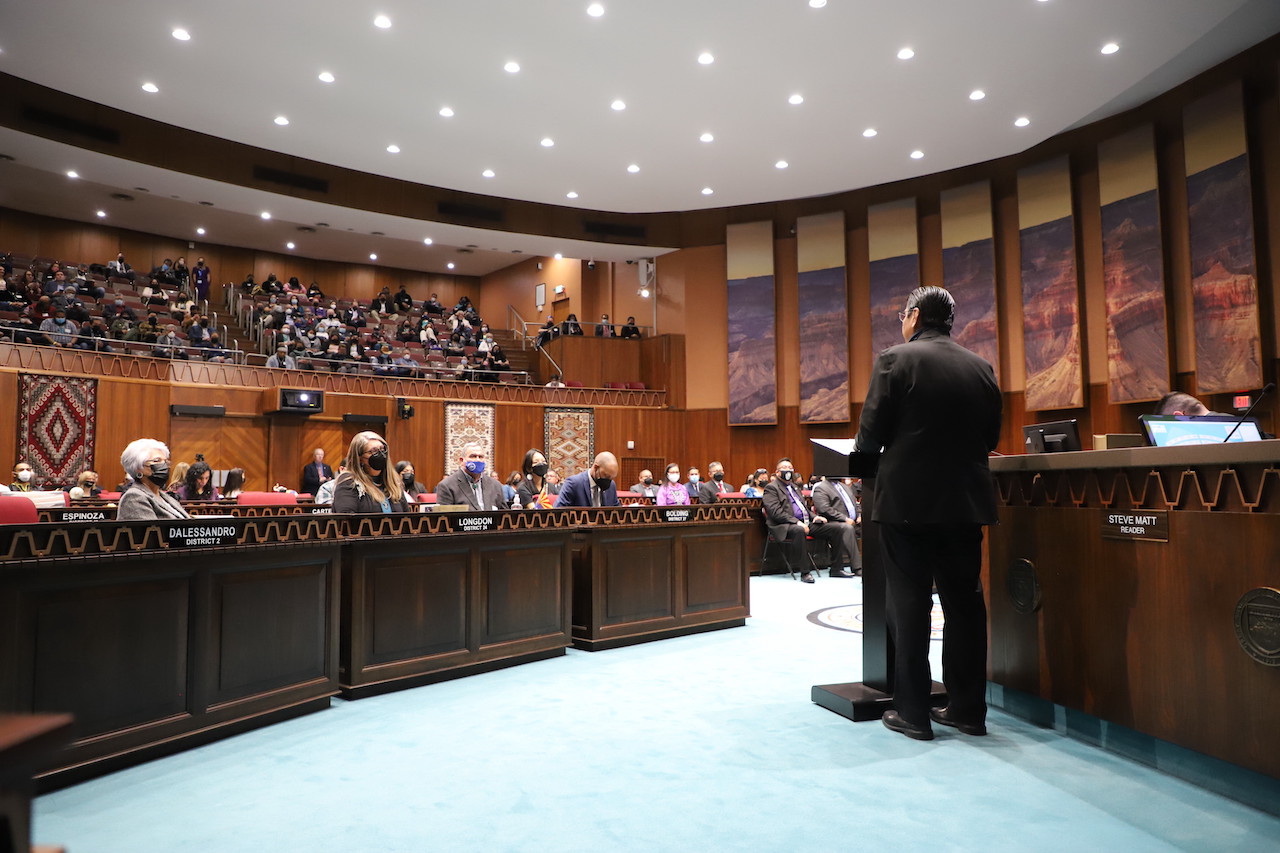
- Details
- By Native News Online Staff
Navajo Nation President Jonathan Nez addressed the Arizona State Legislature and tribal leaders at the Arizona State Capitol last Wednesday, as part of the 27th Annual Indian Nations and Tribes Legislative Day.
Nez, joined by First Lady Phefelia Nez and Vice President Myron Lizer, spoke about the contributions of Navajo people during the COVID-19 pandemic, voting rights, efforts to locate missing persons and the Indian Child Welfare Act, among other topics.
“Throughout this pandemic, just as our elders did long ago during times of adversity, our Navajo people continue to step up and demonstrate the strength and resilience of our ancestors,” Nez said in his address. “We continue to use our way of life teachings, the teachings of our elders, to push back on COVID-19.”
Want more Native News? Get the free daily newsletter today.
When the pandemic began, Navajo leaders distributed PPE, food, water, firewood and other essential items to their communities, Nez said. “We stood shoulder to shoulder with our frontline warriors and showed them that we love them, that we care for them, and that we are in this together.”
Nez called for a moment of silence in the Arizona House of Representatives to honor frontline workers and Navajo people who passed on during the pandemic, including former Navajo Nation President and Arizona Senator and Representative Albert Hale. Hale passed away nearly one year ago from complications due to COVID-19.
“Despite the heartache and losses of loved ones, our Navajo people continue to fight back,” Nez said.
He noted that 72.5% of people on Navajo Nation are vaccinated against COVID-19 with two doses of a vaccine. Of elders who are 65 years and older, 87% are vaccinated with two doses. “This shows that our elders continue to lead the way and set a great example for our people,” he said.
Nez also urged state lawmakers to support Native people’s voting rights.
“Many of our elders and those living in remote communities have to drive hundreds of miles and several hours to cast their ballot, and when they get to the voting polls, they have to contend with language barriers because many are fluent in the Navajo language only,” Nez said. “We need voting laws that uphold and protect all citizens’ rights to vote.”
Nez highlighted the Navajo Nation’s investments in infrastructure development to improve Navajo families’ access to clean water and electricity. Through 2020 CARES Act funds, they were able to extend water lines and connect over 700 homes to the electric grid, he said. He called on state leaders to support the Navajo Nation’s water rights.
He also highlighted efforts to help locate missing persons, undertaken by grassroots organizations, task forces, First Lady Nez and Second Lady Dottie Lizer. The Navajo Nation is developing a Missing Persons Unit to devote more resources to locate missing Navajo brothers and sisters, Nez said.
Nez requested the legislature’s support to pass an Indian Child Welfare Act bill to support tribes in custody matters involving children who are enrolled members of Navajo tribes.
He also called on state leaders to submit letters to the Arizona Corporation Commission in support of Coal Community Transition funding for the Navajo Nation, in response to the 2019 closure of the Navajo Generating Station and Kayenta Mine.
Nez recognized and thanked various Navajo state leaders, including Sen. Theresa Hatathlie, who was sworn in last Monday to represent Arizona’s seventh legislative district, former State Rep. Arlando Teller, who accepted a position as Deputy Assistant Secretary for Tribal Affairs with the U.S. Department of Transportation under the Biden-Harris Administration, and Chinle Unified School District Superintendent Quincy Natay, who was recently recognized as Arizona’s Superintendent of the Year.
He also recognized Navajo State Representative Jasmine Blackwater-Nygren, who filled the vacancy left by Teller to represent District 7. Lastly, he thanked Myron Tsosie, who is serving his second term as a state representative for District 7.
“On behalf of the Navajo Nation, I thank all of you,” Nez said. “We are very proud to have so many young Navajo people serving and representing us in these high positions.”
More Stories Like This
Native News Weekly (August 25, 2024): D.C. BriefsDeb Haaland Earns Endorsement From Communications Workers of America Local 7076
University Soccer Standout Leads by Example
Two Native Americans Named to Democratic Congressional Campaign Committee's“Red to Blue” Program
Cheyenne River Youth Project Hosts Young Women’s Winter Camp as Part of Lakota Culture Internship
Help us defend tribal sovereignty.
At Native News Online, our mission is rooted in telling the stories that strengthen sovereignty and uplift Indigenous voices — not just at year’s end, but every single day.
Because of your generosity last year, we were able to keep our reporters on the ground in tribal communities, at national gatherings and in the halls of Congress — covering the issues that matter most to Indian Country: sovereignty, culture, education, health and economic opportunity.
That support sustained us through a tough year in 2025. Now, as we look to the year ahead, we need your help right now to ensure warrior journalism remains strong — reporting that defends tribal sovereignty, amplifies Native truth, and holds power accountable.
 The stakes couldn't be higher. Your support keeps Native voices heard, Native stories told and Native sovereignty defended.
The stakes couldn't be higher. Your support keeps Native voices heard, Native stories told and Native sovereignty defended.
Stand with Warrior Journalism today.
Levi Rickert (Potawatomi), Editor & Publisher

